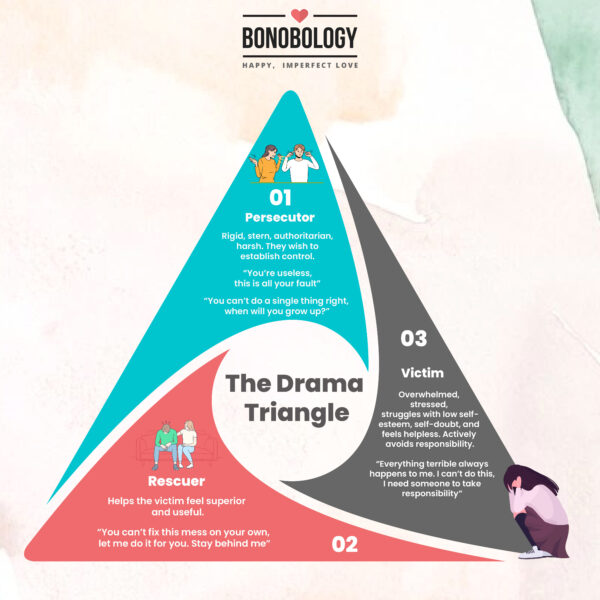Today, we’re talking about the roles people in romantic relationships may unknowingly pick up. And what is this relationship triangle called? The ‘Drama Triangle’ (you will see why). With the help of psychologist Pragati Sureka (MA in Clinical Psychology, professional credits from Harvard Medical School), who specializes in individual counseling through emotional ability resources, let’s take a look at this relationship triangle psychology.
What Is The Relationship Triangle?
A relationship triangle is not to be confused with a love triangle, where three romantic interests are involved. Nor is it to be confused with Robert Sternberg’s Triangular Theory of Love, which talks about the nature of the love two people share. What is a triangle relationship called? And what is this psychology triangle that promises to explain the problems that fester in our intimate relations? Simply put, the relationship triangle, a.k.a. the ‘drama’ triangle, tells us about the three roles that people in relationships may unknowingly settle into and enforce upon each other, which eventually leads to, well, drama. The roles – namely the victim, the persecutor, and the rescuer – can often be found in any dynamic largely because they’re interchangeable and complement each other. When one person is willing to be overwhelmed and play the role of the victim, you always see a persecutor or a rescuer at play. “We tend to struggle in relationships because we don’t know the role we play in triangle relations. The victim is always asking for help, always playing the victim card, and assuming that someone else is responsible for their life,” says Pragati. “In the long run, these roles, though they may be assumed unknowingly, cause conflict in relationships. Take, for example, a set of parents and a child. The mother may have a problem with the child not studying and may lash out at him/her, and the father may continually shelter the child. “As a result, the mother becomes the persecutor, the child the victim, and the father the rescuer. When these roles are set in stone, they lead to friction and self-esteem issues, especially amongst the victim. The issues essentially arise because none of us like being told what to do. If a child is constantly made to feel that the tension in the house is constantly because of him/her, they’ll play the victim in their own relationships when they grow up. Or, in rebellion, they’ll become the persecutor,” she concludes. The relationship triangle (victim, rescuer, persecutor) is a vicious one, and the fact that these roles are so interchangeable makes it extremely difficult to pinpoint who’s playing what role and when they need to be addressed. It is definitely not a healthy relationship triangle. Such triangle relationships may lead to permanent harm to a person’s psyche, which is why it’s important to acknowledge and end them immediately. However, to figure out how to get out of these triangular relationships, you need to know what role you may be playing.
Understanding The Roles In The Drama Triangle
It may seem like your equation isn’t affected by this relationship triangle psychology. There’s no power shift, no drama, and certainly no blame-shifting in your relationship. Right? Let’s take a detailed look at the relationship triangle roles, so you can figure out if yours has ever seen a similar equation.
1. The persecutor
A frustrated individual, more often than not someone who wishes the victim would just “grow up, already”. As a result of their anger, they may blow up about insignificant things, making sure that the victim is made aware of his/her incompetence. The role of the persecutor usually stems from frustration. They wish to establish control. They’re rigid, stern, authoritarian, and tend to at least appear more powerful than the others in the relationship triangle. The way the role of the persecutor is manifested is highly subjective. However, a common theme is that this person blames the victim for everything that may not go according to plan.
2. The victim
Where there’s a persecutor, there’s always a victim. “The victim is someone who constantly feels helpless,” says Pragati, adding, “They may feel like they can’t cope with life. A lot of people ask me if it’s only neurotic and weak-willed people who become victims, but that’s not necessarily the case. “Sometimes, due to a lot of different factors, people may feel that someone else is responsible for their life, or it’s just because they lack self-confidence. The victim usually never works on themselves, simply because they think they’re incapable of doing so. It may sound counter-productive, but I feel a lot of women take on the victim role since it then becomes easy to blame everything on patriarchy, it becomes easier to blame things on the spouse, and it becomes easier to dismiss any responsibility. “If a victim realizes they don’t have to play this role, if they understand that they can thrive and grow and not be manipulated in the relationship, there’s no reason why they can’t escape it. My recommendation? Take responsibility, read books by Maya Angelou, and try to work on yourself immediately.”
3. The rescuer
“I’m here now, I’ll tell you how to fix everything because you can’t figure it out. Stick with me, I’ll shelter you from the persecutor and make this go away,” is basically the anthem of the rescuer. “Normally, the rescuer enables a person,” says Pragati, adding, “Take, for example, your loving grandparents. They’ve never let you get in harm’s way and always dissuaded your parents from scolding you, right? In a way, they enable bad behavior by always intervening as the rescuer. “A rescuer encourages another person to be needy. The sentiment behind their rescuing antics may sometimes be, “You can’t fix your life by yourself, so I’ll teach you how to fix it.” Oftentimes, the fact that there even is a persecutor and a victim is because of the rescuer.” Now that you have a better idea of how this triangulation relationships psychology features three unique roles, it’s also worth looking at how seamlessly the roles may seem to be interchangeable.
How Are The Roles Interchangeable In A Relationship Triangle?
Is the victim always the victim in such triangular relationships? Does the persecutor always stay so belligerent and harsh, even though the rescuer may make their rudeness apparent? Pragati tells us all we need to know about how these triangle relationship roles complement each other. “There is a persecutor because someone is willing to play the victim. If a person stops playing the victim, the persecutor will be forced to analyze his or her actions. Moreover, the persecutor feels so strong because they have projected that strength and anger onto others. The victim doesn’t realize that they are stronger than they think they are, and they may not be able to catch the signs of a manipulative partner. “Someone who takes any kind of misbehavior actually fans it. The persecutor isn’t necessarily as tough or as strong as they think. It’s just that they’re allowed to get away with a lot of things. As a result, the victim carries their weakness. But when it gets too much, a victim may think “I’ll show you. How dare you do that to me?” Or they might want someone else to rescue them, or they may even become the rescuer for someone else. The rescuer may get tired of trying to fix everything and may get annoyed with the victim as well. As a result, they may also take on the role of the persecutor,” she explains. The reason why it’s so hard to spot the roles in the psychology triangle is largely that they tend to change and complement each other. If one day the rescuer wants to simply blame the people around him/her, you’ll be left too confused to try and figure out what the dynamics of that particular relationship triangle are like.
How To Break Out Of A Relationship Triangle
When you’re too busy fixating on why the persecutor is being as mean as they are, you’re not going to be thinking about the triangulation relationships psychology. All you’ll care about is finding a rescuer who comes to save you from your troubles. Pragati tells us how figuring out that you needn’t and shouldn’t rely on someone else to fix your problems can help you break out of such complicated triangle relations.
1. Break free of the victim shackles
“For there to be any satisfaction in a relationship and to be able to break out of this dynamic, the victim must realize that they can be their own rescuer,” says Pragati, adding, “When you decide to stand up for yourself, you can get out of the role that has probably been pre-defined for you, or the role you have learned. “The reason we are essentially unhappy is not because of the role we play but because we may feel that someone else can fix us. The only way forward is by accepting and telling yourself that you are strong and independent. If you are caught up in a toxic drama, you have to acknowledge that you’re also doing something that may be making you miserable. “Rather than expecting your environment to change, you have to see what you can change within yourself. Is your self-confidence low? Or are your coping skills low? Perhaps financial freedom may help you, or a basic sense of independence. The biggest step you can take to break free of the relationship triangle is to understand that change starts from within. Instead of trying to figure out who’s playing what role, try to work on yourself.
2. Effective communication
“There needs to be effective communication as well. A lot of the time, the victim also doesn’t put the message across in the right tone of voice. Either they may be too charged up or they may be too scared of the reaction and clam up. If two people are talking, you’ve got to use the right tone of voice and very measured statements. If someone wants the undivided attention of someone, the best way to start off is by asking for it,” says Pragati. Though it may seem like the only thing you experience is abuse and belittlement in your relationship, it’s important to make sure your tone of voice is not threatening. If anything, by now you must realize that the persecutor isn’t really the kind who takes criticism constructively.
3. Seek professional help
When things may seem out of hand or you feel that communication just isn’t possible in your toxic dynamic, seeking the help of an unbiased third-party professional is the best thing you can do. A therapist will be able to tell you what’s wrong in your relationship and exactly what you need to do to fix it, offering a non-judgmental perspective on the situation. If it’s help you’re looking for, Bonobology’s panel of experienced counselors is just a click away. Now that you know what the relationship triangle is and how we may unknowingly fit into these interchanging roles, hopefully, you have a better idea of how to break out of it too. For those who find themselves stuck in such a loop, Pragati shares one final piece of advice. “Instead of blaming the circumstances or the people around them, a person needs to focus on building themselves up. At the end of the day, however bad the environmental standards are, we are born free. We’ve got to feel that freedom in our heads, that’s what every victim needs to start off with. If something’s constricting you, focusing on unraveling the knots in yourself,” she says.



